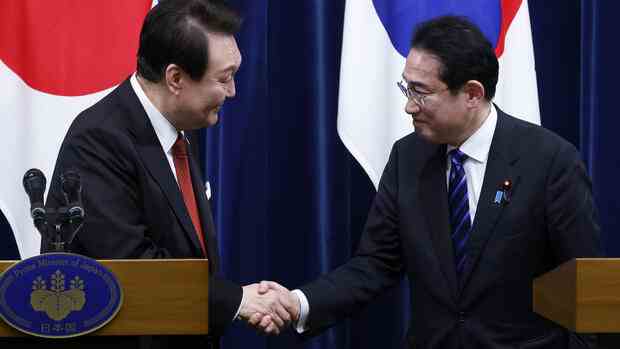Tokyo For the first time in twelve years, Japan’s Prime Minister Fumio Kishida received a South Korean head of state for a state reception this Thursday. At Kishida’s official residence, he and his guest Yoon Suk Yeol inspected a military honor guard.
This was followed by a handshake for the cameras – and talks about closer cooperation in security policy and supply chains. “A new chapter” in Japan-South Korea relations is set to begin today, Kishida said. Yoon spoke of “a new era”.
The choice of words was by no means exaggerated. Since 2011, South Korean presidents and Japanese prime ministers have only met on the sidelines of multilateral conferences or at joint meetings with US presidents. The countries had been so divided by the failed reappraisal of the Japanese annexation of Korea (1910-1945). Both are now approaching an agreement.
Neighborly strife has been hampering US attempts to build a stronger alliance against China in Asia for years. The relief in Washington and Tokyo was all the greater when the conservative Yoon won the elections against the left camp in early 2022. Concerned about China’s rearmament and North Korea’s nuclear weapons program, he promised a rapprochement with Japan. Under his left-wing predecessor, Moon Jae-in, the already cool relationships had finally frozen.
North Korea’s protest note showed that the Japanese-South Korean summit is seen by the neighbors as a security policy signal. Despite a United Nations test ban, North Korea launched another long-range missile for test purposes on Thursday morning. Kishida and Yoon’s topics of conversation also send clear geopolitical signals.
Together against North Korea and China
The focus was on resuming security policy cooperation. Both countries share concerns about North Korea, China’s rearmament and the threat to Taiwan, as well as concerns about the security of sea routes in the Indo-Pacific region, said Rui Matsukawa, foreign policy officer for Japan’s ruling LDP party.
>> Read also: The German economy is discovering Japan as a counterweight to China
Both countries also want to further improve cooperation with the USA. Yoon also promised a return to a military information sharing agreement (GSOMIA), which his predecessor Moon had scrapped. In the past, the agreement was seen as the first step towards closer military cooperation.
Kishida also said: “We will resume our shuttle diplomacy.” This means close diplomatic exchanges between Seoul and Tokyo that were discontinued ten years ago. In addition, both sides want to resume their military consultations, which have been interrupted for five years.
Economically, both countries want to jointly strengthen the supply chains for critical components, especially semiconductors. Along with Taiwan and the US, they are part of US President Joe Biden’s Chip4 alliance.
Disputes about history continue to smolder
However, both sides are aware that this is actually only the beginning of a lengthy balancing act. LDP politician Matsukawa pointed out: “So far, the mood in our relations was minus 100, now it’s at zero.” It is also unclear whether the rapprochement will last this time. Because in the background, an unresolved ongoing dispute over the history of the Japanese annexation of Korea continues to smolder.
Choi Eun Mi, a researcher at South Korea’s Asan Institute for Policy Studies think tank, explains that the two countries have never agreed on a joint assessment of the legality of colonization. “As a result, Japan’s colonization of the Korean Peninsula is considered illegal in Korea and lawful in Japan.”
The stronger South Korea became economically, the more openly the conflict flared up. Under Yoon’s predecessor Moon and Japan’s conservative Prime Minister Shinzo Abe, who wanted to end Japan’s apologies for its own history, this turned into a serious crisis. First, Moon set up a fund to compensate Korean war prostitutes. Then courts ruled that Japanese companies had to compensate “forced laborers.”
In Japan, however, this was seen as a breach of the basic agreement of 1965, which was actually used to settle such compensation. After taking office in May 2022, Yoon tried to ease the situation – contrary to the majority opinion among South Koreans.
This month he suggested solving the conflict through a private compensation fund, which should primarily be filled with money by South Korean companies. Kishida welcomed the advance. It’s just not yet clear whether Yoon can implement his plan at home.
The opposition and those affected reject Yoon’s compensation fund.
(Photo: AP)
The opposition has slammed the move as the “worst diplomatic humiliation” since Korea’s submission to China more than 400 years ago. Some of those affected reject it, as do 59 percent of South Koreans, according to opinion polls.
On the one hand they demand the involvement of Japanese companies, on the other hand a new apology from the Japanese government, which is unlikely. Yoon and Kishida now want to reduce the existing differences by expanding “forward-looking relationships”.
More: The 215 billion project – South Korea wants to create semiconductor empire.
